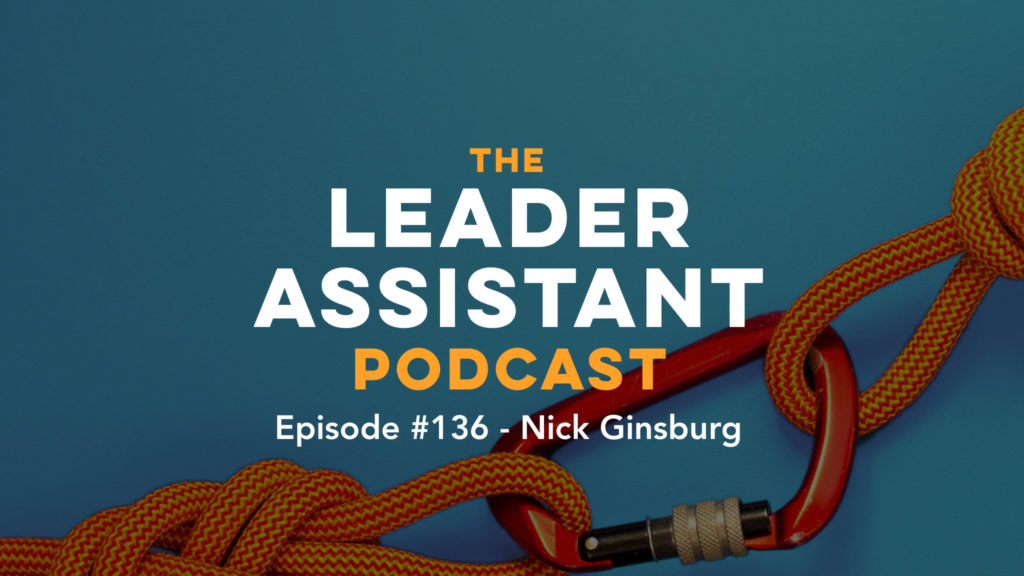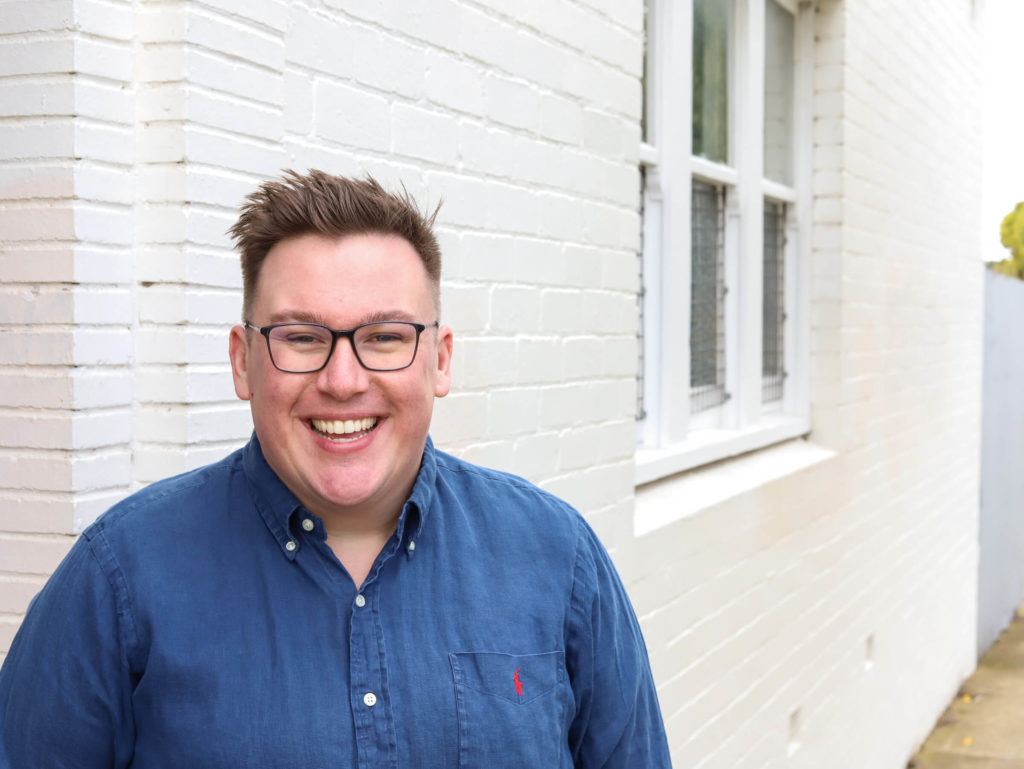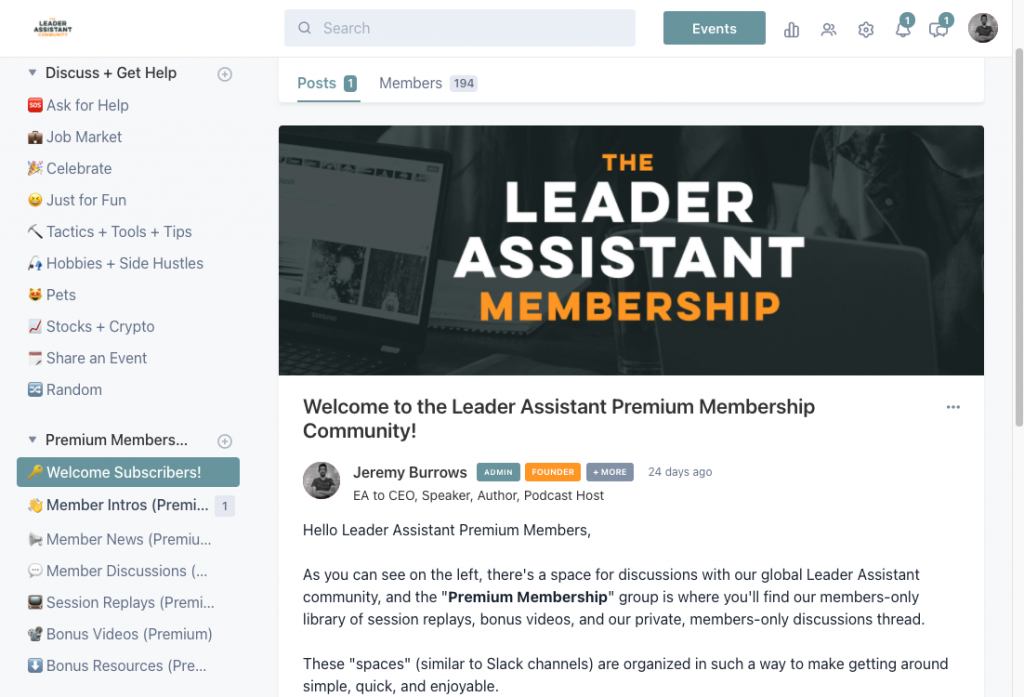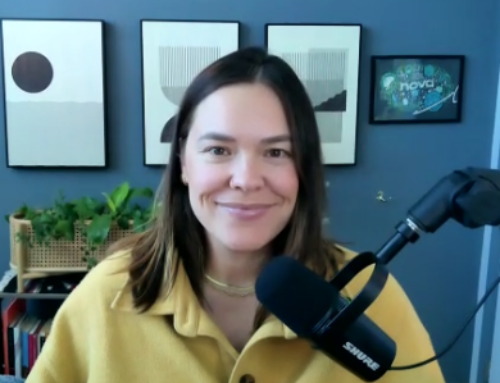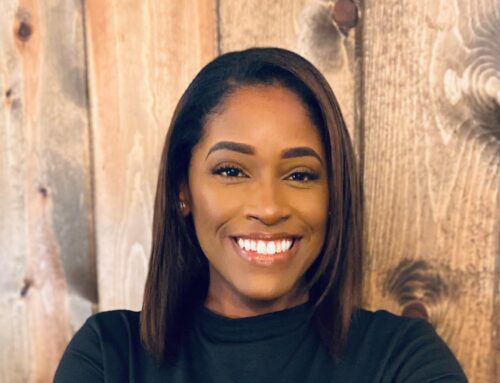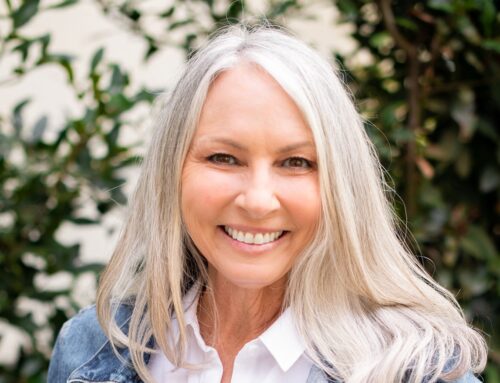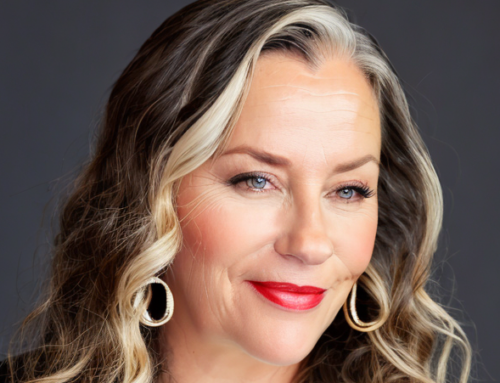Nick Ginsburg is a passionate and innovative Executive Assistant and mental health advocate. By day he is the Executive Assistant to the Provost and Senior Vice-President at Monash University and by night he is the host of The Open Drive Podcast and Founder of The Collective, a judgment-free community for administrative professionals worldwide.
Nick and I talk about authenticity, building and cultivating a community, and more! Note: this is Nick’s second appearance on the show, so be sure to check out our first conversation in Episode 18 of The Leader Assistant Podcast.
LEADERSHIP QUOTE
A brave leader is someone who says, “I see you. I hear you. I don’t have all the answers, but I’m going to keep listening and asking questions.”
– Brene Brown
CONNECT WITH NICK
- nickginsburg.com
- Instagram – instagram.com/nickginsburg
- Linkedin – linkedin.com/in/nickginsburg
- Twitter – twitter.com/itsnickginsburg
ABOUT NICK
Nick is a passionate and innovative Executive Assistant and mental health advocate. By day he is the Executive Assistant to the Provost and Senior Vice-President at Monash University and by night he is the host of The Open Drive Podcast and Founder of The Collective, a judgment-free community for administrative professionals worldwide.
Productivity, emotional intelligence and relationship building are his strengths and passions. He thrives off helping people by bringing them together to share their knowledge and grow in their careers.
You can find out more information about Nick at nickginsburg.com or by joining in the conversation on Instagram (@nickginsburg).
LEADER ASSISTANT LIVE EVENTS
Check out our constantly updated schedule of events for admins and assistants at LeaderAssistantLive.com.
THE LEADER ASSISTANT PREMIUM MEMBERSHIP
To learn more about how you can join the now 200+ growth-minded Leader Assistants, check out our Leader Assistant Premium Membership for ongoing training, coaching, and community.
THE LEADER ASSISTANT BOOK
Download the first 3 chapters of The Leader Assistant: Four Pillars of Game-Changing Assistant for FREE here or buy it on Amazon or Audible.
JOIN THE FREE COMMUNITY
Join the Leader Assistant Global Community here, or the Facebook Group here for bonus content and to network with other assistants who are committed to becoming leaders!
SUBSCRIBE
Subscribe to The Leader Assistant Podcast so you don’t miss new episodes!
You can find the show on Apple Podcasts, Spotify, Google Podcasts, Pandora, and Stitcher.
Join my email list here if you want to get an email when a new episode goes live.
LEAVE A REVIEW
If you’re enjoying the podcast, please take 2 minutes to rate and review the show on Apple Podcasts here. Each review helps me stay motivated to keep the show going!
—
EPISODE TRANSCRIPT
Nick Ginsburg 0:00
Hi, I’m Nick Ginsburg. Today’s leadership quote comes from Brene Brown. A brave leader is someone who says, I see you. I hear you. I don’t have all the answers, but I’m going to keep listening and asking questions.
Podcast Intro 0:17
The Leader Assistant Podcast exists to encourage and challenge assistants to become confident game changing leader assistants.
Jeremy Burrows 0:26
Hey, friends, thanks for tuning in to Episode 136 of The Leader Assistant Podcast, your host, Jeremy Burrows. And before we jump into today’s interview, I wanted to invite you to check out our upcoming event schedule. We have events for professional development, networking, and training for executive assistants, administrative assistants, executive business partners, Chiefs of Staff, whatever your title is, if you’re in a support admin role, these events are for you. And we have live events. We have virtual live events we have on site live events. And then we have ongoing training and coaching in our premium membership as well. But specifically today, I just wanted to invite you to check out our event schedule at leaderassistantlive.com. That’s leaderassistantlive.com will actually be in San Jose in January. So we’re excited about that there’s limited tickets available. We’re about 75% sold out right now. So leaderassistantlive.com/sanJose for that one. But again, just check out the full schedule at leaderAssistantlive.com. Hey, friends, thanks for tuning into The Leader Assistant Podcast. It’s your host, Jeremy Burrows. And I’m very excited to be speaking again with Nick Ginsburg. Nick, how’s it going?
Nick Ginsburg 1:50
Good. Thank you for having me back. I’m very excited.
Jeremy Burrows 1:54
Yeah, so for those of you who haven’t heard, hit, Nick, in the first episode that we chatted on, check out episode 18. That’s episode one, eight, at leader assistant.com/one A leader assistant.com/one Eight. And that would be our initial conversation. I think that was pretty much the first time we had ever connected, Nick. And it was a great interview had lots of great feedback from it. Again, Episode 18, you can get more of Nick’s background and kind of his journey into the EAA profession. And we talk a lot about different topics on that episode. But I’m not going to regurgitate all of that, and have Nick say the same stuff over and over again. So we’re gonna have kind of a part two here. And the first thing I want to ask Nick is, how many people and you know, just just ballpark rough estimate, have reached out to since being on that podcast episode. I guess I was 100. And my math is bad. 118 or so? episodes ago?
Nick Ginsburg 3:12
Yeah. Look, it feels like a lifetime ago, doesn’t it? Especially with COVID. And my sense of time has gone out the window. But there have been a lot of people. I wouldn’t even be able to put an answer on a ballpark. I mean, I, I didn’t expect for people to still be listening to the episode, which is incredible. I mean, we got tagged in a post an hour ago, I think it was Jeremy about someone that had just listened. And that’s incredible. Amazing. I probably get, I would say, on LinkedIn, anywhere between sort of five to 10 people a month will send me a message and say, just listened was really cool. I wanted to connect. And so that’s that’s incredible. Really incredible.
Jeremy Burrows 4:05
Yeah, that’s awesome. And that was I’m looking back at the date. So we recorded it in 2018 and actually published it. I published it on July 14 of 2019. So it has been kind of ages ago
Nick Ginsburg 4:23
when the world was still normal, Jeremy I know,
Jeremy Burrows 4:25
right? I know. Okay, so what has happened since then in your your world? Are you still an EA? It’s the same company?
Nick Ginsburg 4:35
Yeah, yeah, yeah. Yeah. So I’ve still got my nine to five, which I refer to as my Bruce Wayne job. So I do still the EA to the provost and senior vice president at Monash University, which is a job I really love. I’ve had a change of executive. So I’ve gone from supporting incredible professor named Mark to a new incredible pro Professor name, Susan Eliot. So very lucky, love my job. Awesome, really very little to complain about, as we talked about in the last in episode one for us, I sought out this profession. So I’m living the dream, love it. But since then outside of Monash has really shifted, so when we spoke, I knew that I wanted to get into more public speaking and start sharing my story more. And it started sort of rolling from there. And literally, at the end of 2019, I started getting different EA conferences, booked, which was incredible. And then COVID hit. And it meant, I had to totally shift what I wanted to do and how I share my story. And so I moved very much online, I started an Instagram account that’s predominantly for this, which is where I’m most active, it’s, you’ll have it in the shownotes, I’m sure but it’s at Nick Ginsberg. And so between that in LinkedIn, I started sharing a lot more. And since then, I’ve been incredible. We’ve done some amazing events. So we did a little event called the textbook summit in 2020. We had 900 people registered around the world, I think there were 450 people that stayed logged on for six hours watching us. And we’ve had some incredible speakers. And I’ve done heaps of sort of virtual presenting and luckily slot in a couple of face to face ones. But really, this whole thing has been about sharing knowledge, getting my story out there, both professionally and personally, as well, Jeremy, so I started my own podcast, which has nothing to do with the admin world. I don’t want to get anyone confused. But I started my own podcast called The Open drive, which is about my childhood growing up with parents that struggled with mental health issues and addiction. And that has also been an incredible thing. So all of that stuff outside of Monash I refer to as my Batman stuff. I wish I was Batman, I’m not sadly. But yeah, so that’s all the stuff outside of Monash that I do, and I adore it. And the last thing that I’ve done since was actually, in the end of 2020, I launched an admin community called the collective, which is worldwide. And essentially, it’s a judgment free space for admin professionals to get together to share ideas to hear from experts from around the world. We had you on our last session, which was incredible. Thank you, Jeremy, for coming. I’m, I’m super proud of the collective and the people that we’ve got in there. So yeah, incredible. So a lot has happened. That was a very brief summary.
Jeremy Burrows 7:59
Yeah, so Okay, so what has your company or organization thought about your kind of Batman side? hustles? are, have you? I’m assuming you’ve told them about it, since you’re willing to talk about it on a podcast and put yourself out there. But was there like an initial conversation? Or was it just like, hey, you know, what’s what you do on your downtime is up to you? How was that whole? conversation?
Nick Ginsburg 8:32
Yeah, look, it’s a bit of everything. So I’m a very open and honest person. So I had the conversation, and shared with our chief of staff, and also, the provost, my executive said, Look, this is what I’m starting to do. I’m really enjoying it, I will make sure that it doesn’t encroach on my, my work. And if it does, there are things that we can organize around that to make sure that I’m providing the correct support, which I think is really important, because at the end of the day, my nine to five is still a huge passion of mine. So I want to make sure that I’m giving 110% to it at all times. So that conversation was relatively brief. Actually, I’m very lucky that I said, this is what I want to do. Are there any dramas? The answer was no. And they’ve been super supportive. So both mark my previous boss and sue my new boss, are super, super, super supportive of what I do. I know for Mark he saw it as an extension of himself. So when I was out there speaking publicly around various topics, and and obviously he thought I was doing the right thing. He would see that as reflecting positively on him as well, which I hope it did. Yeah. So the conversation was was pretty easy. I have to say I was, again very lucky. You’re
Jeremy Burrows 10:00
awesome. Yeah, it’s great. I’ve had the similar experience where you just, I was just open, I was actually technically started my side hustle before my current day job. And I just had that conversation with my executive to like, Hey, this is what I want to do. I’m really excited about it. But I won’t let it impact my day job. And you know, what, you want to make sure you’re good with it. So yeah, that’s great. Great to hear.
Nick Ginsburg 10:31
And I think also with that, sorry to jump in. But I think also with those conversations, it’s not just about the conversation, you need to be able to sort of walk the talk. So if you are starting a side hustle, or you’ve got something outside of your day job that you are super passionate about, it’s really important that if you say, Hey, I’m not I’m not gonna let the song encroach on what we’re doing and what I do nine to five, or whatever your hours are, you need to make sure that that’s the case. And so over the past, coming up to two years, and you would be the same Jeremy, I haven’t let it encroach. I don’t think my I think my executive at times forgot that I do that stuff. Because I was able to still keep supporting them at the level that I was pre the side hustle.
Jeremy Burrows 11:22
Yeah, awesome. Well, let’s talk about authenticity a little bit, too, you know, is digging into this a little bit deeper, for an executive assistant. You know, oftentimes, we are probably tempted to be inauthentic, or we don’t, we may not call it being inauthentic. But but you know, if something’s going on, where we are working with maybe a difficult executive or challenging direct report of our executive, and, you know, we have a different angle on things, we have a different line of sight on how things are going. And we have a lot of input. And in my opinion, we have a lot of great insight to where the executive and where the team is going or isn’t going. But, you know, I know I’ve struggled with this in my past, and I’ve seen this in other assistants as I coach assistants, one on one and in group settings. You know, it’s hard to just be open and honest. And just say what we think, when it feels like our job is on the line, or the good relationship we have with with a colleague is could be on the line? How do you kind of get the confidence to be authentic and stick your neck out there? For you know, when it’s when you’re really like, Okay, I’m pretty sure this is the right thing that we need to do. But I don’t want to ruffle some feathers.
Nick Ginsburg 13:06
Yeah, look, it’s a really tricky thing. And it’s a, it’s a balancing act. And when I saw this is probably the main thing I speak about. So I have spoken to countless companies for the admin networks as part of their companies. And I would say the majority of the conversations lead back to this. So the How To Be authentic at work, when sometimes workplaces don’t enable authenticity. And that’s not necessarily a bad thing. It’s just some cultures. You can’t navigate that easily. Right? So for me, when I talk about authenticity, it’s your entire self, not just you at work. So when what I’m about to talk through, is for you as a whole, not just Jeremy at work, right? It’s every everything you have to start small. You can’t in my opinion, you cannot go into a situation and have never done that before in diving headfirst. It’s a It’s terrifying, which means you’re probably going to stumble over your words and not seem confident. In be it can be quite a shock to those around you, if that is how you tackle it. So how I go about it is very much baby steps. So I when I talk about it, it’s very much in the sense of how we sew how we we brand ourselves as well. So all of these are so sort of closely linked, right? So if you can start bringing more of yourself to work that includes your your authentic self, bringing more of yourself to work and doing it in baby steps. So looping in parts of you to the conversation in your workplace, that then shows people that you are more than just someone that sits at a desk, right? So that’s step one, then you have this whole other piece of being able to find your voice and speak up. What I often tell people is to start by thinking it through in your head. So when you’re in a team meeting, for example, when someone asks a question, or it gets to a point where questions already, you have something that you want to ask, but you don’t have the confidence, write it down. And just hold on to it, I guarantee you that it will come up at some point where someone will ask a similar question, and then you can go great, I that was right, I should have asked it. And the more you do that, the more you end up with confidence built around being able to speak up. Then when you have that, you’re able to speak up now you don’t dive in headfirst. So you would go in and on a smallest step and say, Actually, I think if we did it this way, it might be better for X reasons. And then the more you do that, the more you’re able to have these conversations. When I am in a meeting, I generally I’m an opinionated person anyways. But I would never speak up. So five years ago, I found it really hard to speak up. Now not so much. If I feel like something should be handled a certain way, or there’s something that we can do differently. I will voice it, but it’s about having the right intent, making sure that you’re coming at it from the right point of view, that you’re not being nasty. It’s about sharing, and having that yeah, that good intent. So that people feel feel alright, as well.
Jeremy Burrows 16:48
Yeah, I love what you said about writing it down and almost like Testing, testing it out. And it helps exactly what it is. It helps Yeah, repetitive and like, just keep practicing. And I was talking to somebody the other day about you know, she was an introvert. I’m an introvert. And she’s like, how did you like, now have a podcast and do speaking and all this stuff, even though you’re an introvert and so well, I scripted pretty much everything early on. Like, I just wrote down every single word that I was going to say if I was speaking, I wrote down every single question that I was going to ask if I was in the podcast. And you know, you can even tell like two years ago, and we first talked, you know, I had that interview scripted. I was like, here are the questions I’m going to ask. I just went, boom, boom, boom. And, you know, today, I didn’t even send you questions. I was like, Oh, just winging it. So anyway, I just yeah, that writing it down and practicing it. And then you just over time you build that confidence. So yeah, well say,
Nick Ginsburg 17:59
Yeah. And it’s such a it’s it is, I think a lot of people underestimate that, that part of it. Because if you if you everyone has thoughts when they sit in particularly in a meeting, if we talk about that, everyone will have a thought, right? But when you don’t speak up, it’s generally because you feel like it’s either a stupid question, or a stupid idea. Or that it’s not going to be received well. So what if by writing those down, you can gauge where your mind is, and where your thinking is compared to the rest of the group because someone else will end up asking the question, there’ll be an extrovert in the meeting that will say it, you just have to wait for that moment for someone to say it. And when that happens, ticket and go, Ah, see, I was alright, perfect. So next time, I’m going to do it, or in a couple of times, I’m going to do it. It’s all about going at your own pace and making sure that you’re not overwhelming yourself, because that’s where people fall over.
Jeremy Burrows 18:59
Yeah, I agree. Okay, let’s shift gears and talk about communities. So you know, you’ve got your community that you said pretty much since the episode 18 of this podcast and July of 2019, you have been building your network and your community and what do you see is the value of community the number one kind of value of communities specifically for executive assistants?
Nick Ginsburg 19:31
It’s, I mean, so I have to so I’ve got an internal Monash network that we have, and there’s about 250 people in that. And then I’ve got the collective and both of them have the same benefit. And it has been super clear during COVID. So I think the number one benefit is being able to talk to people that are like you. So being able to bring a group together that has similar interests understand your job, because the role of an EA no matter what level you’re at, is lonely. It can be really lonely. But I started and I think I mentioned this in Episode 18, that I started the monashee network because I sat in a building filled with the A’s, and felt totally alone. And so both of those communities, building those has purely been about connection, about giving people a space where they feel like they belong, and they can share their thoughts around various things. And so having that is just so powerful. And I’m sure you found a similar thing with your community as well.
Jeremy Burrows 20:45
How do you kind of fight back? Or maybe that’s not the right way to say it, but cultivate your community in such a way that it’s not just a bunch of the same? Like, how do you? How do you make sure that it’s, you can talk to people like you, but also learn from people not like you? Like, yeah, I’ve found for me, for my community, the leader, Assistant community, I found that it’s Listen, we have we have this one likeness, if you will. And that’s the fact that we are executive assistants, or growth minded executive assistants. And that’s the thing that connects us. But then all the other stuff, you know, your religious beliefs, your advances, Agnes can ever say that where you’re, you know, where you’re from, how old you are, how many years you’ve been assistant, all that stuff doesn’t matter. So anyway, that’s kind of how I’ve, I’ve seen it, but just curious about how you you’ve cultivated your community. So that’s diverse. Because I agree, it has to be a niche, it has to be like, Alright, you’ve got to have this this thing that like everybody can connect, and relate to.
Nick Ginsburg 22:08
Yeah, absolutely. And I think you really nailed it. So for both of them. The common denominator is that we are assistance. Everything outside of that, people are different. And that doesn’t matter what community you’re in. In terms of the system communities, doesn’t matter which one you’re in, that will generally be the pattern, right? Because we are all humans outside of work. We have different views. We have different life experiences, that all play a part in how we interact with people. And so for, for me, in particularly when I talk about the collective, I started that to be judgment free for a very specific reason, I wanted people to be able to go in and say, Hey, we have this common thing, which is that we’re in a system. But here’s everything else about me. And I want it to be an open, vulnerable, accepting place where people can share whatever they want. And that’s happened. But you have to you have to lead by example. So, for me when I started the collective in particular, and similarly with, with the monashee network, it’s about leading that discussion, how you want people to respond as well. So we have monthly zoom calls for two timezone. So I have two monthly zoom calls. And part of that is doing a roundtable at the collective and it’s how are you? It’s got nothing to do. It doesn’t have to have anything to do with your job. It’s how are you going? What’s happening in your world? Is there anything you want to get off your chest? My mom passed away beginning of this year. And let me tell you, the collective heard every part of my grief journey, because that’s what the community is for. That is why I built it that way, not for me personally, although that did help. But it’s to enable people have those to have those those same conversations. So throughout COVID, particularly here in Australia, where we’ve had some of the longest lockdowns in the world. People are sharing how they’re feeling. And I mean, that does huge amounts to destigmatize anything to do with mental health, which is another huge passion of mine. So leading by example, and showing people how you want them to show up in your group, in your community, and not over manufacture, keep it casual, keep it fun, allow people to the space to be able to mingle and get to know each other.
Jeremy Burrows 24:56
Yeah, I love what you said about just checking in and saying you know, how are you Okay, so there’s two questions I like to do when I’m doing that with people are two questions I like to ask and I’m gonna ask them to you right now. Okay, so the first one is what are you grateful for?
Nick Ginsburg 25:16
So hilariously, I do in the week with gratitude every Friday on LinkedIn and Instagram with you may have seen. So I think about this stuff all the time. So at the moment I am especially grateful for I think, hilariously, last week was about the connections I’ve made in the AI community. But right at this second, Jeremy, I am grateful for the sun and fresh air. And those, those are little things, but we are moving out of winter here in Australia. And I’m super grateful that I can stand out on our patio, in the sun with fresh air and not have a mask on. Because I’m in my home. Nice. So that’s what I’m grateful for.
Jeremy Burrows 26:07
Yeah, we’re enjoying some amazing fall weather here in Missouri, and it’s gonna get cold pretty quick. So I’m trying to enjoy every every last minute before it drops 40 degrees. But yeah. Okay, so the second question is what concerns you?
Nick Ginsburg 26:31
Oh, I’m gonna go a bit worldly on this. I’m, what concerns me at the moment, is people are very quick to talk about a lot of things at the moment. So, for me, my space is in mental health of the stuff, a lot of the stuff that I’m doing at the moment. So a lot of people are very quick to talk about mental health and how important it is to D stigmatize it. But it concerns me that these conversations don’t seem to be happening enough offline. So there’s lots of conversations online that are around mental health, which is fantastic, and they need to happen and they need to continue happen happening. But from what I can see, there aren’t enough of those conversations also happening face to face.
Jeremy Burrows 27:29
Yeah, how do you? You know, I know you said that. You’ve been a bunch of lockdowns, but how do you? How do you have those conversations in person like, Hey, do you literally say, do you comment on people and on the thread and say, Hey, let’s take this offline and chat about it. Yeah.
Nick Ginsburg 27:49
Yeah, exactly. Right, are jumping. So obviously, so I’m still in lockdown in Melbourne, I can’t go anywhere, I can’t see anyone face to face. But you can still have that quote, unquote, face to face. So you can jump on a zoom or a Skype call and or teams call and have a chat with someone if you notice that. They’re not feeling great. Even phone calls. So myself and our team at work, we have regular phone calls, and half of whom are about work, maybe, maybe the rest are how are you traveling? Very important mental health conversations. And not that you would go Hi, Jeremy, I want to have any important conversation with you about your mental health. That’s not how you want to lead into it. It would be Hey, Jeremy, how you traveling? Or exactly those two questions that you’ve just asked me, Jeremy and perfect. So what are you grateful for? What’s something that’s bothering you at the moment? Really good questions.
Jeremy Burrows 28:51
Yeah. So okay, so speaking of mental health, what’s one thing that you would encourage those listening, specifically assistants all over the world? who are struggling with varying degrees of severity of mental health? And yeah, obviously different different types and different seasons and all that. What’s one thing that you would say to those listening who are really struggling?
Nick Ginsburg 29:23
Yeah, yeah. I mean, we could do a whole episode on this alone, Jeremy, but I will, I will summarize it for you. So there’s a couple of things. You’re You’re not alone. Other people are absolutely feeling a similar way. You just may not know it. And seeking help is not weak. And this is particularly to people that have quite a high level of pride in themselves will often see seeking help or talking to someone as a weak form. It actually is incredibly courageous to be able to see Say, Hey, I need to talk to you about this or go to your, your your GP, your doctor and say, I need to get a referral through to a psychologist to talk to someone, that’s a really courageous thing to do. For me, just very briefly, I, I grew up pretty traumatic childhood, with my parents, I’m very lucky, I don’t have any sort of severe mental health issues. However, there’s a lot to process from that. And everybody has their own experiences. And I think everybody at some point in their life should be able to stop and go and see someone professionally, and talk it out. Even from a work perspective, it’s really important. Most companies will have some form of an especially in Australia, free counseling service as part of a of your employment. I don’t know about the states, but definitely here in Australia there is. And use dies. I mean, I remember having that conversation, to go and talk to someone to process what had happened in my childhood, I was terrified. And there’s a couple of things that I was I was worried about, and I’m going to share them because I think it’s really important to to hear, I was scared that my the therapist was going to open the lid, and Pandora’s box would just kind of explode. And he wouldn’t be able to put me back together. And then the other thing which would didn’t happen, by the way, that’s not how therapy works. And then the other thing was that I was going to be taking a spot away from someone who needed it more than I did. So I didn’t feel like I had any severe mental health issues. I just needed help processing. Whereas there are people that are really struggling that still don’t go see someone, I felt like I was taking a position away from them. And everybody should have the right to go speak to someone. So I wanted to share those. But you’re not alone. And it’s not weak to go and talk to someone. And it’s actually incredibly important.
Jeremy Burrows 32:04
Love it. Yeah, that’s great, great tips. I think that the asking for help is one of the hardest things for people. And you’re right, it’s it’s actually strength to ask for help.
Nick Ginsburg 32:22
So hugely well said, yeah.
Jeremy Burrows 32:26
Okay, so, to kind of wrap things up, I did want to call out again, for people to check out episode 18 To listen to part one of our conversation. I was looking at up again, because it was been so long, I was forgetting what we talked about. But leader assistant.com/one Eight to listen to episode 18. We talked about productivity. We talked about managing email, and we talked about sharing your story. So great. Topics, if for those interested in checking that out. But what is one resource? Maybe it’s a book, maybe it’s a TED talk, maybe it’s a, you know, course or podcast, what’s one resource that you would recommend for assistance right now?
Nick Ginsburg 33:18
Yeah. I, I would highly recommend. And it’s, I mean, I chose Brene Brown as my leadership quote for a reason, I would choose any of her books. So obviously, there are so many incredible assistant lead different things out there that you can learn from, and all of them do a really good job. I mean, obviously, Jeremy, I’m talking to you and you have phenomenal stuff like your book, and there’s podcasts and all of that. But if you want something that isn’t assistance specific, but still applies to your world, and how you lead Brene Browns work is incredible. Now I’m not a reader. So I’m not someone that will sit down with a book, I’m someone that will get it on Audible, and listen to the author. And so that’s what I do. And I’ve listened to I think almost all of her books, you can start with anyone you want. But she is brilliant, at particularly sort of that courageous leadership vulnerability, which is, I think, critical for our roles that high emotional intelligence.
Jeremy Burrows 34:28
Awesome. Yeah. And I definitely recommend Brene Brown as well. And I love that. You know your point about not just assistant resources, but I think that it’s it’s sometimes assistants can kind of get stuck in the world of assistant resources, and there’s so much more out there that they can learn from and so I always say read what your executives are reading, if you really grow so I
Nick Ginsburg 35:01
couldn’t agree more that Jeremy.
Jeremy Burrows 35:03
Well, Nick, really appreciate you taking time again. It’s, yeah, well, maybe in two years, we can do it again. Every two years,
Nick Ginsburg 35:14
right, we buy that. Yeah. I would love that.
Jeremy Burrows 35:17
So where can people find you? And what’s the best way for them to reach out? And I’ll put everything in the show notes. But what’s the kind of one place for them to find you?
Speaker 1 35:28
Yeah, so Instagram is my, my, my sort of favorite communication platform. So I’m a visual person. But I’m on Instagram all the time, you can find me nice and easy. Just at Nick Ginsburg, you’ll see my face pop up. But also, LinkedIn is also a very strong sort of platform for me as well. I really enjoy being on there. So those two are the best places, or just head straight to my website website. So Nickginsburg.com, everything’s in there. You can flick me an email. I’d love to hear from you. And your thoughts on this episode? I would love to hear it like I had from the last episode, which is incredible.
Jeremy Burrows 36:08
Yeah, definitely. And I’ll link to the other episode as well in the show notes. And speaking of shownotes this episode’s show notes can be found at leaderassistant.com/136 since episode 136, LEADERassistant.com/136 All right, Nick. Well, keep doing what you’re doing. Keep being awesome. And thanks again for being on the show and we’ll talk soon.
Nick Ginsburg 36:36
Awesome. Thank you so much, Jeremy.
Jeremy Burrows 36:48
Please leave you on Apple podcasts. Goburrows.com

